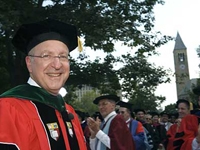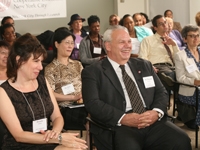Calls for Increased Collaboration Between Campuses

Cornell's 12th president, Dr. David J. Skorton, enjoys inauguration day, Sept. 7. Photo by Jason Koski/Cornell University Photography.
On an exceptionally bright and clear afternoon in Ithaca on Sept. 7, Dr. David J. Skorton was inaugurated as the university's 12th president during an innovative event that featured music, dancing and speeches by members of the university's faculty. For all of the ceremony's pomp and fanfare, the theme of collaboration echoed throughout the afternoon as a way of not only developing new ideas across disciplines, but as vital for the future of the university itself. Coincidentally, three of the five speakers—including Dr. Skorton himself—were practicing physicians, making anecdotes and metaphors about medicine as ubiquitous as the "Cornellian red" faculty robes on display in the audience.
Dr. Antonio Gotto, dean of Weill Cornell Medical College and a colleague and friend of Dr. Skorton for more than 20 years, was a featured speaker at the event, during which he recalled once having to heavily edit a manuscript from a colleague. "I was rather critical of his manuscript and actually requested a number of revisions," Dean Gotto said. "Had I known that I would be speaking at his inauguration 20 years later, I'm sure the critique would have been modified," he joked.

Dr. Antonio Gotto, provost for medical affairs and dean of Weill Cornell Medical College. Photo by Jason Koski/Cornell University Photography.
Dean Gotto emphasized the importance of collaboration between the campuses, and the world beyond. "Today, I believe that the sciences, including medicine, humanities, theology and the arts, are all interconnected but that more can be done to enhance these connections," he said. "Can this gap between science and the humanities be bridged? And in particular, the gap between the Ithaca and New York campuses? While how to do this remains a topic for the future, I believe that Cornell University is admirably positioned to nurture the environment that makes interdisciplinary conversation possible," he said. "Today Cornell University has a commitment to academic collaboration and interdisciplinary learning that is both national and international in scope."
During the inaugural speech, Dr. David Feldshuh, a practicing emergency medicine physician, playwright and professor of theater arts at Cornell, explained how stories, and the humanities in general, inform the sciences.
"Stories have the power to push past incomprehension and chaos and promote understanding," Dr. Feldshuh said. "In the emergency department, for example, sometimes you'll hear something like: 'The belly pain is in cubicle one, the headache's in two and the foot's in three.' Although when I say to the patient, 'Tell me about yourself,' it's a rare patient who will describe him or herself as a foot," he quipped. But on a slightly more serious note, Dr. Feldshuh said the bonds formed across disciplines and campuses provide strength for Cornell in "a world increasingly hostile to free and rational thought."
Perhaps most powerfully, during his inaugural address President Skorton singled out greater collaboration as one of five points outlining his vision for the university.
"We must draw the disparate geographies of Cornell's several campuses into one community, in essence one campus," he said. "Cornell is, indisputably, one of the most distinguished institutions of education, discovery and service in the world, yet further improvement in innovation will undoubtedly occur, in part, at the intersections of curriculums and disciplines, college and campuses. Even if it is a current academic cliché, interdisciplinary studies is one of the paths toward a future of critical thought in every discipline—surely not the only path, but an important one. If we accept this premise, then it follows that more must be done to meaningfully integrate activities of the superb Weill Medical College of Cornell University and its location in Qatar with the truly outstanding sciences at the Ithaca campus," President Skorton said.

Brenda Tobias, director of New York City Relations for Cornell, and Donald Tobias, executive director of Cornell Cooperative Extension-NYC, with faculty and staff from Weill Cornell viewing the live broadcast from Cornell's 34th Street satellite office. Photo by Richard Lobell.
Here in New York City, President Skorton's tenure was kicked off with a collaborative gesture as faculty and staff from Weill Cornell Medical College and Cornell's New York City Cooperative Extension gathered in the university's office on East 34th Street to watch the ceremony via satellite broadcast. For many in the NYC Cornell community, it was the first look at the university's new president.
"Dr. Skorton has an appreciation for the traditions of Cornell University and enthusiasm for its future. His appreciation for the sciences, arts and humanities and outreach are uniquely suited to lead Cornell," said Brenda Tobias, director of New York City Relations for Cornell.
"Any opportunity for faculty and staff to come together is great, but the opportunity to celebrate Cornell's 12th inauguration is particularly special," she added.
Complete coverage of the event from Ithaca, including a video broadcast of the complete ceremony, may be found at http://www.inauguration.cornell.edu.

